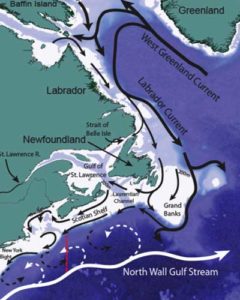Editor’s note: This column by Susie Arnold, Ph.D., a marine scientist with the Island Institute, responds to an op-ed published in the November issue of The Working Waterfront.
An op-ed column in the November issue of The Working Waterfront demands a response.

The column (“Another way to understand the Gulf of Maine”) begins by characterizing statements by Dr. Carla Guenther of
the Maine Center for Coastal Fisheries, quoted in a news story in the October issue, about the rate and cause of warming in the Gulf of Maine. The writer of the op-ed suggested other causes than those asserted by Guenther, when in fact the causes she cited are supported by the latest peer-reviewed scientific literature.
The author of the op-ed continues by sharing several arguments that are not just misleading, but untrue.
I am one of 28 appointed scientists serving on the Maine Climate Council’s scientific and technical subcommittee. Over the past year, we have worked to share the latest science on how climate change is impacting our state, in an effort to inform the Governor’s Climate Action Plan, to be released Dec. 1. A great deal of work has gone into sharing scientific research results in a digestible format with the council’s decision-making body and the public.

While I appreciate that hydroelectric dams do impact their local environments, they are not a driver of the warming in the Gulf of Maine. Mixing this message into the narrative of the Gulf of Maine is confusing and potentially detrimental to keeping the focus on the causes of our localized warming and our strategies for mitigation.
Dr. Andrew Pershing, chief scientist at the Gulf of Maine Research Institute, and his colleagues, published their research findings in 2015 in one of the most premier and rigorously reviewed scientific journals, Science, and stated that the Gulf of Maine warmed faster than 99.9 percent of the world’s oceans between 2004 and 2013. No other large-scale water body warmed faster over that time.
Several reasons for the Gulf of Maine’s rapid warming are discussed in this paper and other peer-reviewed, published literature. All are associated with human caused climate change.
First, and most obvious, is simply background global warming. The air above the gulf is warming, and much of this heat is absorbed by the ocean.
Second, changes in regional ocean currents are occurring. The warm Gulf Stream is shifting poleward, which is linked to increasing greenhouse gasses during the 20th century. Simultaneously, the melting of Greenland ice sheets releases cold, fresh water into the central North Atlantic. The fresh water does not sink like dense, salty water and, thus, diminishes the strength of the colder Labrador Current coming into the Gulf of Maine.
The changes in these water masses—the retreat of the Labrador Current and the northwesterly shift of the Gulf Stream—result in warmer water pooling in the gulf. Additionally, there are correlations between Gulf of Maine water temperature and atmospheric connections and the Pacific Decadal Oscillation and the weakening of westerly winds that are under further study.
Nowhere in any of the reading I have done, nor in the discussions of the Maine Climate Council, were hydroelectric dams in Canada or Russia part of the story of warming in the Gulf of Maine.





